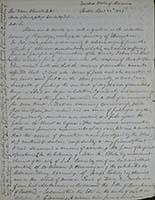Zone d'identification
Cote
Titre
Date(s)
- 24 Apr. 1849 (Production)
Niveau de description
Étendue matérielle et support
4 pp
Zone du contexte
Nom du producteur
Histoire archivistique
Source immédiate d'acquisition ou de transfert
Zone du contenu et de la structure
Portée et contenu
Boston, USA - CTJ's place in the history of the inductive science of physiology, relating to the discovery of etherism. He gives an account of his experience with ether. His experiments 'led me to conclude that the nerves of sensation were paralysed by the ether, and I ventured to declare confidently to my friends, that I had discovered a means of averting the pain of surgical operations'. CTJ wants WW to sanction his claim as the discoverer of the application of ether in surgical operations.
Appraisal, destruction and scheduling
Accruals
System of arrangement
Zone des conditions d'accès et d'utilisation
Conditions d’accès
Conditions governing reproduction
Language of material
Script of material
Language and script notes
Caractéristiques matérielle et contraintes techniques
Finding aids
Zone des sources complémentaires
Existence and location of originals
Existence and location of copies
Related units of description
Zone des notes
Note
William T G Morton, a student of CTJ's, had demonstrated to a group of students and physicians in October 1846 the use of ether as a general anesthetic, and applied for a patent. CTJ in turn claimed he had discovered it. He also claimed to have told Samuel F. B. Morse the principles of the electric telegraph which Morse had patented in 1840. In 1873 he was committed to McLean Hospital as mentally ill. See his entry in the DSB by George E. Gifford, Jr., Vol. VII, pp. 44-46]

